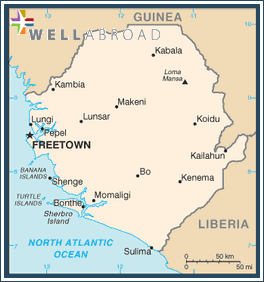|
MOST RECENT ALERTS
There's no recent alert.
|

|
|||||||||||||||
| COUNTRY OVERVIEW | ||||||||||||||||
|---|---|---|---|---|---|---|---|---|---|---|---|---|---|---|---|---|
|
| COUNTRY GENERAL INFORMATION | |||||||
|---|---|---|---|---|---|---|---|
| Language: |
English (official, regular use limited to literate minority), Mende (principal vernacular in the south), Temne (principal vernacular in the north), Krio (English-based Creole, spoken by the descendants of freed Jamaican slaves who were settled in the Freetown area, a lingua franca and a first language for 10% of the population but understood by 95%) |
||||||
| Currency: | Sierra Leonean Leone (SLL) | ||||||
| Predominant Religions: |
Muslim 60%, Christian 10%, indigenous beliefs 30% |
||||||
| National Holidays: | Independence Day, 27 April (1961) | ||||||
| Economic Status: |
Sierra Leone is an extremely poor nation with tremendous inequality in income distribution. While it possesses substantial mineral, agricultural, and fishery resources, its physical and social infrastructure is not well developed, and serious social disorders continue to hamper economic development. Nearly half of the working-age population engages in subsistence agriculture. A recent increase in political stability has led to a revival of economic activity such as the rehabilitation of bauxite and rutile mining. |
||||||
| Security: |
Republic of Sierra Leone Armed Forces (RSLAF): Army (includes Navy (Maritime Wing), Air Wing) |
||||||
| US Presence: |
U.S. Embassy in Freetown
Southridge – Hill Station Freetown, Sierra Leone Telephone: +232 99 1055 00 |
||||||
| Document Requirements: |
A passport and visa are required. Visitors are strongly encouraged to obtain visas in advance of travel to Sierra Leone. Visitors to Sierra Leone are required to show International Certificates of Vaccination (yellow card) upon arrival at the airport with a record of vaccination against yellow fever. The Embassy of Sierra Leone is located at 1701 19th Street NW, Washington, DC 20009; telephone (202) 939-9261. Information may also be obtained from the Sierra Leonean Mission to the United Nations, 245 East 49th St., New York, NY 10017, telephone (212) 688-1656; and from the website of the Sierra Leonean High Commission in London. Overseas, inquiries should be made at the nearest Sierra Leonean embassy or consulate. Visit the Embassy of Sierra Leone’s website for the most current visa information. |
||||||
| Major Airports: |
Airports: 10, Airports w/paved runways: 1 Freetown-Lunghi International Airport (FNA/GFLL) |
||||||
| Servicing Airlines: |
|
||||||
| Risks and Precautions: |
Security in Sierra Leone has improved significantly since the end of the civil war in 2002. The United Nations Peacekeeping Mission in Sierra Leone (UNAMSIL) withdrew in December 2005 and Sierra Leone resumed responsibilities for its own security. The Sierra Leonean police are working to improve their professionalism and capabilities, but fall short of American standards in response time, communications, and specialty skills. |
||||||
| Mortality Statistics: |
Infant MR total: 156.48 deaths/1,000 live births Life expectancy at birth: TOTAL 40.93 years (male 38.64/female 43.28) |
||||||
| Immunization Indicators: |
Required: Yellow Fever upon arrival from all countries Recommended: Malaria, Hep A & B, Typhoid, Rabies If you will be visiting a malaria risk area in Sierra Leone, you will need to take one of the following antimalarial drugs: atovaquone/proguanil, doxycycline, or mefloquine (primaquine in special circumstances and only after G6PD testing). |
||||||
| Infectious Disease Concerns: |
Malaria risk area in Sierra Leone: All Dengue, filariasis, leishmaniasis, and onchocerciasis (river blindness) are other diseases carried by insects that also occur in West Africa. African trypanosomiasis (African sleeping sickness) has increased in Africa (it is epidemic in Angola, Democratic Republic of the Congo, and the Sudan; and highly endemic in Cameroon, Central African Republic, Chad, Congo, Côte d'Ivoire, Guinea, Mozambique, Uganda, and Tanzania; low levels are found in most of the other countries), and an increase in travelers has been noted since 2000. Most had exposures in Tanzania and Kenya, reflecting common tourist routes. Protecting yourself against insect bites will help to prevent these diseases. Schistosomiasis, a parasitic infection, can be contracted in fresh water in this region. Do not swim in fresh water (except in well-chlorinated swimming pools) in these countries. (For more information, please see Swimming and Recreational Water Safety.) |
||||||
| Overall Quality of Medical Services: |
Quality and comprehensive medical services are very limited in Freetown, and are almost nonexistent for all but most minor treatment outside of the capital. Persons with unstable chronic medical conditions that require on-going medical treatment or medications are discouraged from traveling to Sierra Leone. Medicines are in short supply and due to inadequate diagnostic equipment, lack of medical resources and limited medical specialty personnel, complex diagnosis and treatment are unavailable. The quality of medications in Sierra Leone is inconsistent and counterfeit drugs remain a problem. Local pharmacies are generally unreliable. In the event medications are needed, such as over-the-counter medication, antibiotics, allergy remedies, or malaria prophylaxis, travelers may contact U.S. Embassy Health Unit personnel to receive general information about reliable pharmacies. |
||||||
| Providers in Network: |
|
||||||
| Recent Medical Threats/ Concerns/Warnings: |
Schistosomiasis, a parasitic infection, can be contracted in fresh water in this region. Do not swim in fresh water in these countries. |
||||||
| Communications Info: |
Country Code: +232 |
||||||






